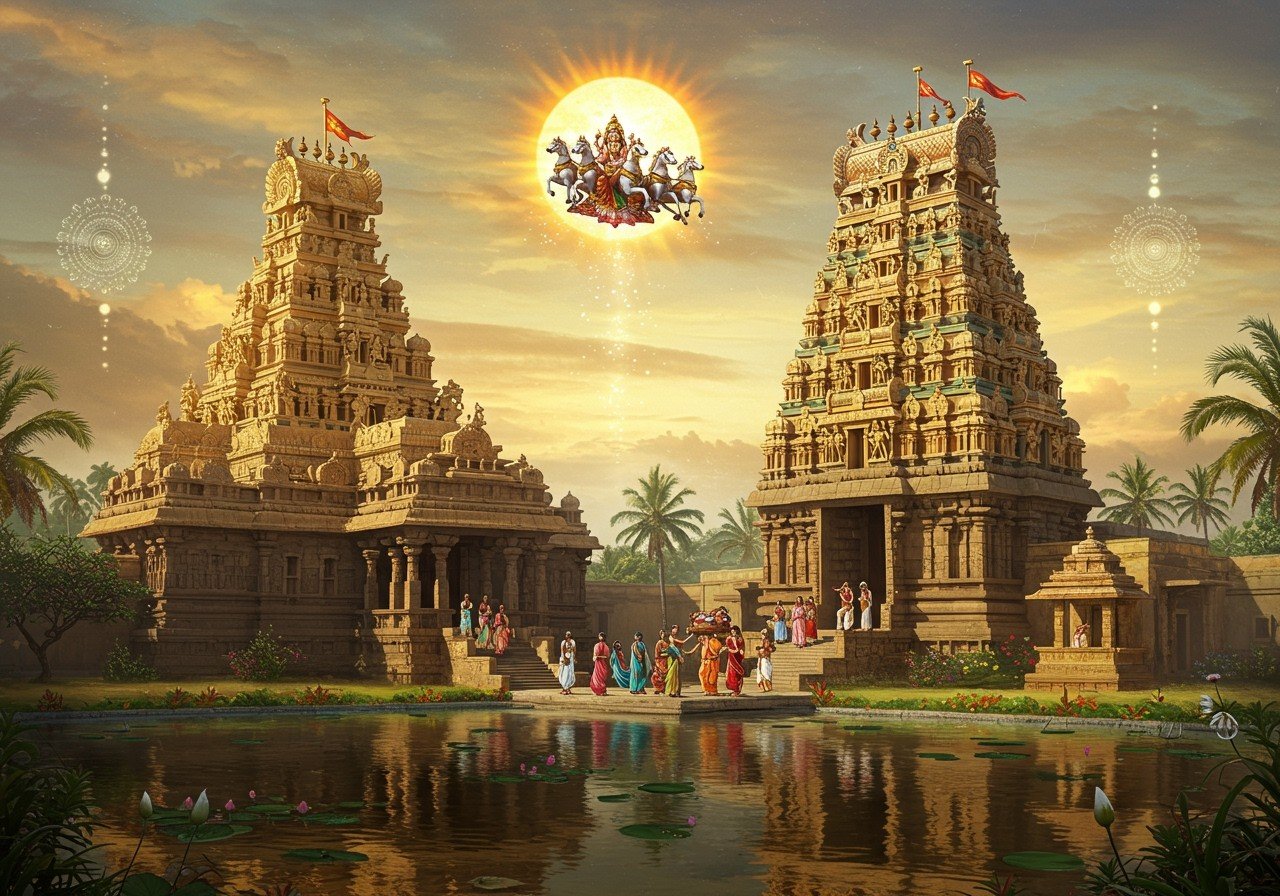
Discover the captivating Suryanarayana Temple, a revered shrine nestled in the heart of Ujire, Karnataka. This comprehensive guide unveils the temple’s historical significance, architectural marvels, and the unique cultural experiences that await you.
Historical Significance
The Suryanarayana Temple, also known as the Shri Sadashiva Rudra Temple, boasts a rich history dating back to the 13th century, as evidenced by inscriptions near the Nandeeshwara Idol. Originally built with the support of the Banga Kings, its name “Surya,” meaning sun, has an intriguing legend associated with it, involving a woman and her son’s discovery of a unique stone while cutting grass. Over the centuries, it has witnessed the rise and fall of dynasties, with each era leaving its mark on the temple’s narrative. These historical layers add to the temple’s allure, making it a site of both historical and spiritual importance.
Architectural Marvels
The temple stands as a testament to the ingenuity of Dravidian architecture. The towering gopuram, intricate carvings, and spacious mandapa showcase exceptional craftsmanship. Traditional materials like stone and wood enhance the temple’s grandeur, creating an atmosphere of reverence and awe. The temple’s layout and design are imbued with symbolic meaning, reflecting the spiritual beliefs of the time and offering a glimpse into the rich architectural heritage of the region.
Deity and Rituals
Dedicated to Lord Surya, the Sun God, the temple is a beacon of light, energy, and life. Daily rituals, including prayers, offerings, and aarti ceremonies performed by dedicated priests, create a vibrant spiritual atmosphere. Special ceremonies and major festivals are celebrated with great enthusiasm, drawing devotees from all corners of the country. These events showcase the temple’s cultural significance and provide a deeply spiritual experience for all who attend.
Visitor Information
Planning your visit to the Suryanarayana Temple is easy. Located in Ujire, Karnataka, the temple is accessible by road, rail, and air. The ideal time to visit is during the cooler early mornings or late evenings, allowing for a peaceful and less crowded experience. Ujire offers a range of accommodations and dining options to ensure a comfortable stay. Guided tours are also available, providing valuable insights into the temple’s history and significance. Check the temple’s official website or local information center for specific darshan timings and any applicable entry fees.
Cultural Experiences
Beyond the temple walls, Ujire offers a rich tapestry of cultural experiences.
Nearby Attractions
- Dharmasthala: A renowned pilgrimage site dedicated to Lord Manjunatha, known for its spiritual ambiance and community service initiatives.
- Jamalabad Fort: A historical landmark offering panoramic views of the Western Ghats and insights into the region’s past.
Local Traditions and Festivals
Experience the vibrant local culture through the region’s colorful festivals, including the grand Rathotsava (chariot festival) at Dharmasthala. These celebrations are marked by traditional music, dance performances, and rituals, creating an immersive cultural experience.
Markets and Shops
Local markets offer unique souvenirs, including the distinctive clay sculptures offered at the Suryanarayana Temple, symbolizing devotees’ earthly desires. Explore traditional jewelry, textiles, and handcrafted artifacts, perfect for commemorating your visit.
Culinary Delights
Indulge in the region’s culinary delights, such as Neer Dosa, a soft rice pancake, and Mangalorean Buns, a sweet banana bread. Local eateries provide an authentic taste of the region’s cuisine and warm hospitality.
Scenic Beauty
Ujire is surrounded by natural beauty, from lush greenery and rolling hills to serene rivers. Explore the nearby Kudremukh National Park, a haven for diverse flora and fauna. Trekking enthusiasts can discover picturesque waterfalls and breathtaking viewpoints.
How Poojn.in Can Enhance Your Spiritual Journey
Poojn.in, India’s leading online store for spiritual and puja items, can help you prepare for your visit to the Suryanarayana Temple. We offer a wide selection of authentic products, including:
- Pure Brass Bishnu Ji (Narayan Ji) Murti: This beautifully crafted murti is ideal for home worship and allows you to maintain a connection with the divine even after your temple visit. Crafted from pure brass with a golden finish, this 11×5.5 inch idol is a sacred addition to your personal altar.
- Bel Mala: These traditional prayer beads are made from the wood of the Bel tree, sacred to Lord Shiva, and are commonly used in worship rituals. Available in sets of two, these malas are perfect for personal prayer and meditation, enhancing your spiritual practice.
For all your puja needs:
- Contact us at +91 7908548235
- Visit www.poojn.in
Conclusion
A visit to the Suryanarayana Temple is a journey of discovery, encompassing spirituality, history, culture, and natural beauty. From the temple’s historical significance to the vibrant local traditions and the serene landscapes, Ujire offers a truly enriching experience. Plan your visit today and immerse yourself in the wonders of this sacred destination.
Frequently Asked Questions
What are the temple’s visiting hours? The temple is open daily from 6:00 AM to 12:00 PM and 4:00 PM to 8:00 PM.
Is there an entry fee? No, there is no entry fee to visit the Suryanarayana Temple.
When is the best time to visit? Early mornings or late afternoons offer a more peaceful and less crowded experience.
Are there special rituals or events? Special rituals and events are held during festivals like Rathasapthami and Makara Sankranti.
How can I contact the temple? For contact details, visit the temple’s official website or inquire at the local information center.
Is parking available? Yes, ample parking is available near the temple.
Are there accommodation options nearby? Yes, various hotels and guesthouses are available in Ujire.
Is photography allowed? Photography is generally allowed but may be restricted in certain areas. Check with temple authorities.


